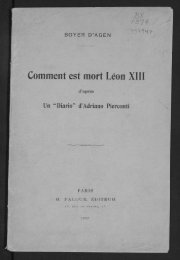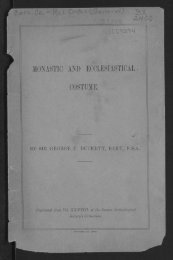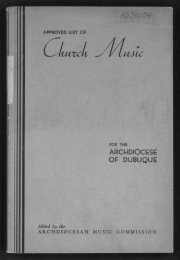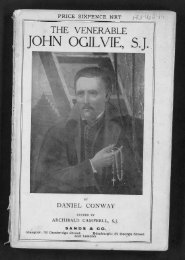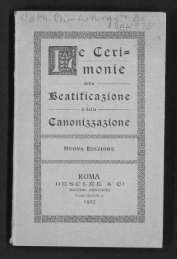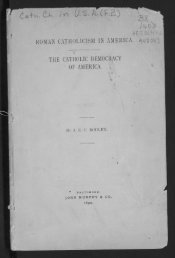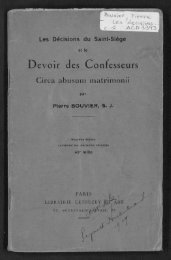Fabiola : or, The church of the catacombs - Digital Repository Services
Fabiola : or, The church of the catacombs - Digital Repository Services
Fabiola : or, The church of the catacombs - Digital Repository Services
Create successful ePaper yourself
Turn your PDF publications into a flip-book with our unique Google optimized e-Paper software.
12<br />
from whence she could sec <strong>the</strong> road. <strong>The</strong>re she sat knitting,<br />
eri.-Ji activity, a thick stocking f<strong>or</strong> her charity<br />
THE XVTAIIY'S DAUGHTER.<br />
Mi.'do was <strong>the</strong>n about seventy years <strong>of</strong> age. She was<br />
tall, thin and as straight as an arrow; h<strong>or</strong> face ra<strong>the</strong>r long, her<br />
luiline, her lips compressed, in consequence <strong>of</strong> <strong>the</strong> loss <strong>of</strong><br />
her front teeth. Her features indicated a great strength r>f will,<br />
and would have been, perhaps, a little stern, if it had not been<br />
f<strong>or</strong> <strong>the</strong> sweet expression <strong>of</strong> her large, grey, and still very beautiful<br />
Ilrr dress was half like that <strong>of</strong> a nun, half like that <strong>of</strong> a peasant<br />
It consisted <strong>of</strong> a gown made <strong>of</strong> a thick, dark stuff; a round<br />
white plaited cap, and a stiffly-starched handkerchief standing<br />
out. iu projecting folds over her bosom.<br />
Wlien Madame Lescalle's wonderful bonnet appeared in <strong>the</strong><br />
road, <strong>the</strong> old lady rose and went to meet her relatives.<br />
"<br />
Well, Virginie," she said, "are you pleased with your visit?"<br />
Madame Lescalle shrugged her shoulders and answered, "Madame<br />
de Vedelles was civil enough; but she is not particularly<br />
agreeable. I think she is as stiff as a poker that woman."<br />
"And <strong>the</strong> Count?"<br />
"Upon my w<strong>or</strong>d, I<br />
and that wa.s all."<br />
hardly saw him. He just bowed to us<br />
"My dear," M. Toussaint put in<br />
me on business."<br />
"<strong>the</strong> Count had to speak to<br />
"<br />
Oh, <strong>of</strong> course; but he might have said a few w<strong>or</strong>ds to us."<br />
" He sent his son to make acquaintance with you."<br />
"Oh, yes! and a charming young man he is; so handsome and<br />
tall, and conversable too, quite different from his parents."<br />
" He is <strong>the</strong> eldest son.Jhe only one <strong>the</strong>y call What do<br />
<strong>the</strong>y call him?" M. Lescalle asked.<br />
"<br />
M. Jacques," Rose said.<br />
"Ah! you remember his name, mademoiselle," Madame Lescalle<br />
laughingly remarked, and <strong>the</strong>n added in a low voice to Aunt<br />
Mode, " He looked a great deal at Rose, and he said something<br />
complimentary about her complexion."<br />
"She is not an ugly little thing," <strong>the</strong> aunt rejoined, kissing<br />
one <strong>of</strong> Rose's blooming cheeks.<br />
" But what is far belter than compliments, Aunt Mede," M.<br />
Toussaint said, " is <strong>the</strong> certainty <strong>of</strong> being employed in <strong>the</strong> entire<br />
nicut <strong>of</strong> <strong>the</strong> Count's affairs. He is tired <strong>of</strong> business, and<br />
means in future to leave everything to me. This will necessitate<br />
ing a great deal at La Pinede. I am going to breakfast<br />
<strong>the</strong>re to m<strong>or</strong>row. We have to talk about <strong>the</strong> lease <strong>of</strong> a farm.'<br />
" How ancry <strong>the</strong> Arnoux will be," Madame Lescalle exclaimed.<br />
"Oh! but you must not say anything about it, Virginie."<br />
"<br />
Why not?"<br />
"<br />
It is better M. Arnoux should suppose I go <strong>the</strong>re as a friend.<br />
It will have a better effect."<br />
"My po<strong>or</strong> dear Toussaint," Aunt Mede exclaimed, " what a<br />
foolish s<strong>or</strong>t <strong>of</strong> vanity that is!"<br />
"<br />
My dear aunt, people value us acc<strong>or</strong>ding to <strong>the</strong> value we set<br />
on ourselves. I learnt that in Paris. F<strong>or</strong> one person who looks<br />
into things, five hundred take <strong>the</strong>m on trust, and believe you are<br />
what you give yourself out to be."<br />
"<br />
I know <strong>of</strong><br />
" I do not like that principle," Aunt Mede said.<br />
a better one, I think."<br />
" What i.s it, Aunt Mede?"<br />
"<br />
It is better to be, than to seem, w<strong>or</strong>thy <strong>of</strong> esteem."<br />
"<br />
Oh! that is a line sentence f<strong>or</strong> a copy book, Mise Mede; but<br />
high flights do not answer in real life. Come now, you<br />
'limit that if <strong>the</strong>y think me in <strong>the</strong> town on intimate terms<br />
at <strong>the</strong> chateau, it will give me a s<strong>or</strong>t <strong>of</strong> prestige. If 1 am simas<br />
<strong>the</strong> factotum <strong>of</strong> <strong>the</strong>' old Count, it will not do<br />
iod. Trust to mo, my dear aunt. I know<br />
Veil' :<br />
''<br />
'r my little bark. It has made good way already, I<br />
m influential person at <strong>the</strong> elections, and people<br />
up to me in consequence <strong>the</strong> Richers on <strong>the</strong> one hand,<br />
'lids on tin' oilier. lam not quite sure that <strong>the</strong> de<br />
notions <strong>of</strong> that s<strong>or</strong>t too. I am ra<strong>the</strong>r in-<br />
it tin- future will show. JS'ow, let us go to<br />
eat."<br />
<strong>The</strong>y<br />
all went into <strong>the</strong> house, and <strong>the</strong>n on <strong>the</strong> terrace, where<br />
dinner was served amidst <strong>the</strong> onr \\ <strong>the</strong> place where <strong>the</strong><br />
view was most beautiful and extensive To <strong>the</strong> right rose <strong>the</strong><br />
crested walls and picturesque gateways <strong>of</strong> LaCiotat, surmounted<br />
by <strong>the</strong> ro<strong>of</strong>s <strong>of</strong> <strong>the</strong> houses. Fur<strong>the</strong>r on a high rock, called <strong>the</strong><br />
Eagle's Beak, stood out in hold relief against <strong>the</strong> deep blue sky.<br />
To <strong>the</strong> left a beautiful rang, <strong>of</strong> hills enfolded <strong>the</strong> bay in which<br />
lies <strong>the</strong> p<strong>or</strong>t <strong>of</strong> Tou.on on <strong>the</strong> f<strong>or</strong>eground, exactly opposite,<br />
was <strong>the</strong> picturesque litt.e islet called 1'Ile Verte, and <strong>the</strong> sea<br />
glittering like burnished gold in <strong>the</strong> broad sunshine.<br />
It was just at <strong>the</strong> same hour that Ge<strong>or</strong>ge de Vedelles was stand-<br />
ing at his window, absently gazing on <strong>the</strong> magnificent landscape.<br />
"Does not <strong>the</strong> sea look beautiful from my terrace, Rosette? "<br />
Aunt Mede said to<br />
"<br />
her niece. We have taken away all <strong>the</strong><br />
palisades which used to surround it, little one, to prevent your<br />
falling over <strong>the</strong> edge and nothing now impedes <strong>the</strong> view."<br />
" Oh, Aunt Mede. it is indeed very beautiful," <strong>the</strong> young girl<br />
said, and <strong>the</strong>n f<strong>or</strong> a moment remained in silent admiration. "I<br />
never saw so bright a sunshine as that at St. Benoit, <strong>the</strong> walls<br />
were so high." And <strong>the</strong>n <strong>the</strong> conversation turned again on <strong>the</strong><br />
inhabitants <strong>of</strong> <strong>the</strong> chateau.<br />
In <strong>the</strong> midst <strong>of</strong> Madame Lescalle's ra<strong>the</strong>r prosy descriptions,<br />
Mise Mede said, Bu you only speak<br />
"<br />
thought <strong>the</strong> Countess had two sons?<br />
<strong>of</strong><br />
,<br />
one young man. I<br />
"Yes, Aunt Mede," Rose answered, "<strong>the</strong>re is ano<strong>the</strong>r, <strong>the</strong><br />
youngest son, a pale, slight, strange looking 3'outh."<br />
"No one pays any attention to him," Madame Lescalle rejoined.<br />
" He is a funny s<strong>or</strong>t <strong>of</strong> creature half-witted, I think. Between<br />
ourselves, people say he is sifaila* and I dare say <strong>the</strong>y are right."<br />
" Who says so? " M. Lescalle asked.<br />
"Oh, I don't know everybody. Gautier, <strong>the</strong> farmer at La<br />
Pinede, who sometimes w<strong>or</strong>ks in <strong>the</strong> garden, and Marion <strong>the</strong><br />
milk woman."<br />
" What do <strong>the</strong>y Know about it? "<br />
"Marion says tha as she was walking in <strong>the</strong> night to Beausset<br />
with her eon, <strong>the</strong>y saw a ghost, as <strong>the</strong>y thought, walking by <strong>the</strong><br />
seaside. <strong>The</strong>y were dreadfully afraid at first, but as <strong>the</strong>y camo<br />
nearer, who should it have been but that young de Vedelles.<br />
She said something to him, but he did not answer, and walked<br />
away in ano<strong>the</strong>r direction. She said he looked as pale as a<br />
ghost, and stared at <strong>the</strong>m ever so strangely."<br />
'How can you listen to such foolish gossiping st<strong>or</strong>ies, Vir-<br />
ginie?" <strong>the</strong> notary said.<br />
Oh, I suppose you think, <strong>the</strong>n, that <strong>the</strong>re is nothing strange<br />
in a man's mooning about <strong>the</strong> beach at three o'clock in <strong>the</strong><br />
m<strong>or</strong>ning, when he ought to have been in bed."<br />
"I dare say it was some piece <strong>of</strong> nonsense. Perhaps he<br />
meant to frighten <strong>the</strong> women going to market,"<br />
"<br />
Very likely indeed; but unless a man is a fa da, he does not<br />
play suth tricks when he is no longer a school boy."<br />
"<br />
Perhaps if this po<strong>or</strong> young man is in <strong>the</strong> state you suppose,"<br />
Aunt Mede said, " he may be restless and nervous. J-'niJun have<br />
<strong>of</strong>ten delicate nerves, and are bad sleepers. Did <strong>the</strong> Countess<br />
"<br />
say anything about her son's health?<br />
"No; but I think she seemed a little ashamed <strong>of</strong> him. She<br />
looked quite distressed when he left Rose and me so suddenly."<br />
" "<br />
And <strong>the</strong> Count?<br />
" He did not mention him at all," M. Lescalle answered. "I<br />
do not think he likes him."<br />
"<br />
Po<strong>or</strong> youth! " "<br />
Mise Mede said who would care f<strong>or</strong> him if<br />
;<br />
his mo<strong>the</strong>r died?"<br />
"Do not distress yourself<br />
about that, my dear aunt," 51<br />
calle answered. "His fa<strong>the</strong>r is very rich, and it will not be dif-<br />
ficult to find him a wife. When a man can give his son fifteen<br />
thousand francs a year, <strong>the</strong>re is no difficulty in getting some one<br />
to look after him "<br />
"Oh, fa<strong>the</strong>r," Rose exclaimed, "who would marry a/







